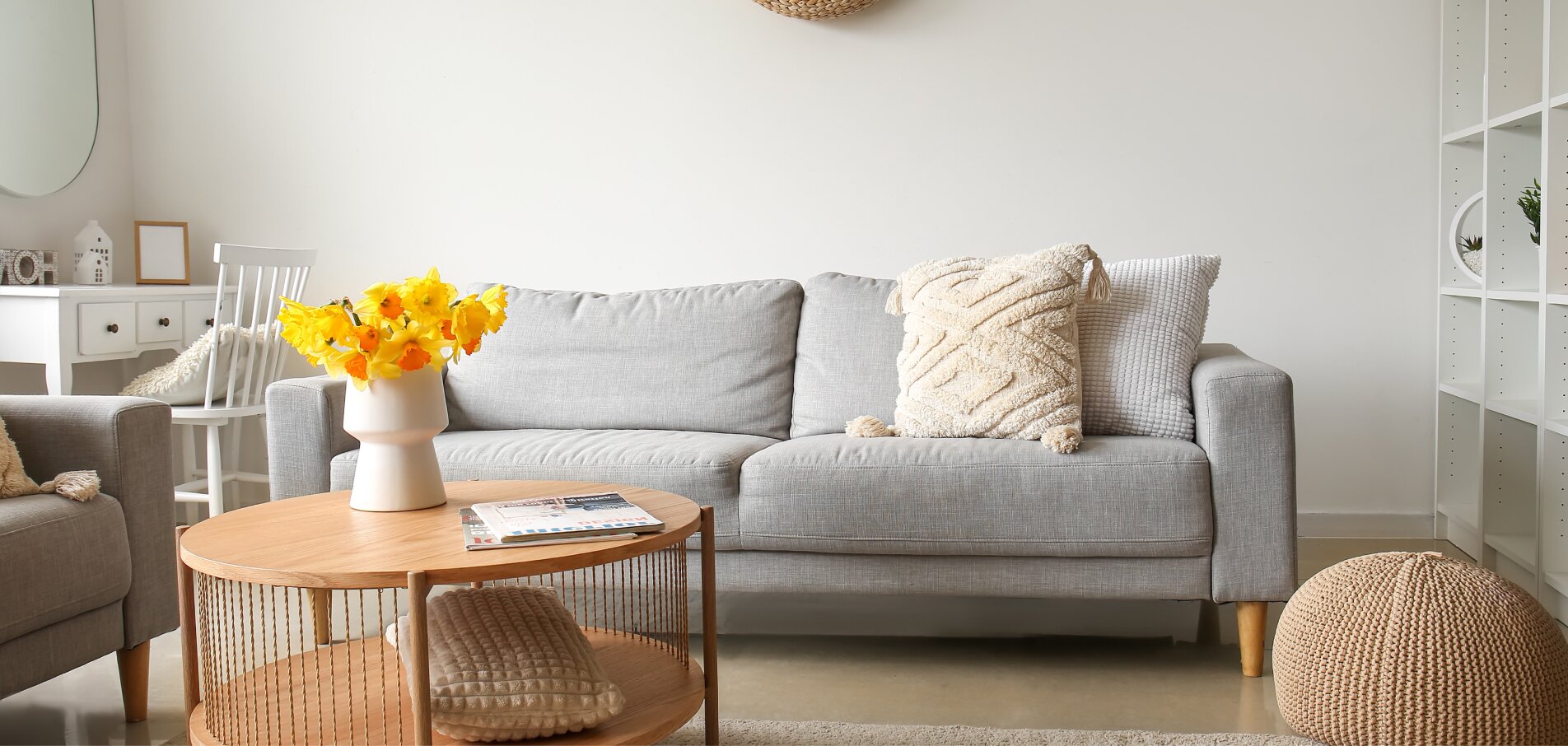You're on the list
By signing up, you agree to receive email marketing.


Having to furnish a small living room doesn't mean you have to compromise on style, comfort, or function. It just means you have to plan a little smarter.
Strategically designed living rooms feel cozy and welcoming, while cluttered or clunky decor can make a tight space feel even smaller. Ultimately, it's all about making the most of the space you've got. And between choosing living room furniture, creating a layout, and appointing details, there's a lot to consider.
The first step is the most important. If you get the measurements wrong, chances are nothing else will work.
Knowing the dimensions of your room (length, width, and height) is a good start, but it's not enough! Other things to consider and measure include:
The area above the doorways or underneath stairwells
The relative positioning of lighting sources and electrical outlets
Any beams, columns, or bulges on the walls that might affect layout plans
The space you'll need to move around the room and access seating
The space between doors and windows relevant to walls and other furniture
If you're unsure, learn how to measure a room's dimensions to design your small living room with precision and confidence.
Effective living room designs for small spaces use layouts that combine style and functionality.
Lamps and sconces mount easily to walls and take up little to no room.
Wall-mounting your TV and/or speakers also frees up valuable floor space.
Coat racks or a holding place for keys can also be mounted.
Wall-planters are excellent for adding a splash of green.
Curtains high above the window frame can make ceilings appear taller.
Shelves near the ceiling will draw eyes upward and make use of the higher space.
Bicycles can also be stored vertically on the wall for extra room.
Make use of corner spaces with corner shelving.
If a corner is too small for a table, put it in an accent chair and convert it into a reading nook.
Put a shelf above the doorway, perfect for books or other display items.
Loose wiring from devices in your entertainment unit (TV, video game console, cable box, modem, speakers, etc.) can make a room feel cluttered. To avoid this effect in small living rooms — where you notice it even more — hide your wiring with cord covers or a cable management box.
Storage space is necessary for every room in the home. But when it comes to small spaces, you need to incorporate them strategically:
Tall, narrow shelving units maximize vertical space without overcrowding.
Store flat items in the space below sofas and entertainment sets.
Many ottomans have storage space and provide extra seating.
You can store things in benches with hollowed-out insides.
Light and color play a huge part in how a room feels, including brightening a space and helping it feel bigger:
Choose light wall colors.
Lay down a white, beige, or cream-colored rug.
Use light curtains and blinds to allow more light in.
Select a similar color scheme to unify and expand the feel of a space.
Furniture style and functionality is a critical consideration when looking to maximize space. Choose pieces with features suited for tighter spaces when furnishing small rooms:
Quickly put one away to make more room.
They tuck away neatly when not in use.
Convert your living room into a guest room.
They take up less space and are easier to walk around.
Opt for slightly smaller furniture that fits the room's scale.
Use them to save space over traditional hinged doors.
Add storage in the unused space at the base of cabinets.
Store them away when not needed to free up space.
They're extra seats you can easily move out of the way.
Many living room decor ideas for small spaces help them feel comfortable and cozy:
Use wallpaper, art, curtains, and other accessories with vertical lines to heighten the room.
These can be as stylish as they are useful as a storage solution you can tuck into nooks and crannies.
In small spaces, one large piece will have a better impact and open up a room. On the other hand, many small pieces will clutter up the walls and make them look busy.
The less complicated, textured, or bulky your lighting, the better. Choose clean, contemporary fixtures to avoid unnecessarily busying up the room.
Finally, visual tricks are great for lending a more expansive feel to a space. Try these ideas to make smaller living rooms appear bigger:
Place mirrors strategically to reflect light and make the space appear larger
Glass or acrylic furniture keeps the room feeling open.
This creates a sense of more floor space.
Routinely clear out clutter and keep only the essentials in your living room. This will help maintain a consistently clean, organized look, which prevents a room from getting cramped.
Design techniques can help you brighten an interior, make a room feel bigger, and economize space where there isn't much to work with.
With a bit of planning, a small living room can be welcoming, comfortable, and functional. Make it a cozy, richly decorated room brimming with life or a minimalist space designed for comfort. With tasteful and strategic ideas, you can make the most of any small space.
You're on the list
By signing up, you agree to receive email marketing.